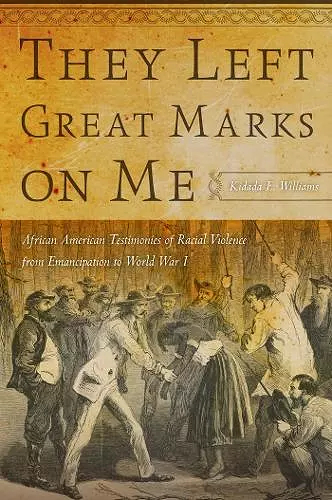They Left Great Marks on Me
African American Testimonies of Racial Violence from Emancipation to World War I
Format:Paperback
Publisher:New York University Press
Published:12th Mar '12
Currently unavailable, currently targeted to be due back around 7th January 2025, but could change

Examines African Americans' testimonies about racial violence
Shares wrenching accounts of the everyday violence experienced by emancipated African Americans
Well after slavery was abolished, its legacy of violence left deep wounds on African Americans’ bodies, minds, and lives. For many victims and witnesses of the assaults, rapes, murders, nightrides, lynchings, and other bloody acts that followed, the suffering this violence engendered was at once too painful to put into words yet too horrible to suppress.
In this evocative and deeply moving history Kidada Williams examines African Americans’ testimonies about racial violence. By using both oral and print culture to testify about violence, victims and witnesses hoped they would be able to graphically disseminate enough knowledge about its occurrence and inspire Americans to take action to end it. In the process of testifying, these people created a vernacular history of the violence they endured and witnessed, as well as the identities that grew from the experience of violence. This history fostered an oppositional consciousness to racial violence that inspired African Americans to form and support campaigns to end violence. The resulting crusades against racial violence became one of the political training grounds for the civil rights movement.
In They Left Great Marks on Me, Kidada Williams gives us a breakthrough in the reading of sources that reframe African American accounts of violence between the end of the Civil War and the beginning of the First World War. ... Kidada E. Williams has given us an insightful look into the everyday terror black southerners faced between emancipation and the First World War and how their retelling of that violence shaped movements to combat lynching, disfranchisement and extralegal & justice. Her study is important and suggests there is much more work to be done in recovering African American responses to post-emancipation white violence. * Journal of Social History *
Her work succeeds admirably, particularly in its demonstration that the best sources for historians to study racial violence come directly from the mouths of the African Americans who survived it. * Journal of American Ethnic History *
Williams has offered a fascinating new approach to the study of mob violence and provided a richer understanding of African American experiences under white supremacy. * Journal of American History *
In her important, beautifully written book, Kidada E. Williams powerfully intervenes in the academic narrative of lynching, recovering African American testimonies of white terror and what she calls the 'vernacular history' that blacks constructed with regard to white efforts tore-subjugate African Americans after Reconstruction...Williams's superlative interpretation of African American responses to racial violence should be read by all interested in the histories of American lynching and the African American experience. -- Michael J. Pfeifer * American Historical Review *
The author of this study brilliantly telegraphs the significance of her work in the title of the book and examines how the savage violence inflicted upon African American men, women, and children from the close of the Civil War to Woodrow Wilson's war to 'make the world a safe democracy' wounded their bodies, psyches, and communities...Williams lifts the curtain on this sinister and brutal stage of American history to reveal pain and loss and African Americans' steely determination to resist subjugation by whites and to demand full citizenship from the federal government. -- Allison Gloria Dorsey * Historian *
Williams analyzes one means by which African Americans resisted the brutalities of white violence from 1865 through the 1920s and the impact of this activity to support the subsequent successes of the post-WWII civil rights movements. Highly recommended. -- E.R. Crowther * CHOICE *
Kidada Williams's They Left Great Marks on Me is an impressive and important contribution to our understanding of African American life after the Civil War. Whereas most previous scholars utilized the records of the Freedmen's Bureau and other agencies to document the causes, characteristics, and extent of anti-black violence during the postebellum period, Williams focuses on the importance of the testimony itself, especially to the African Americans who were brave enough to provide such testimony in the hostile environment of the era. She convincingly argues that this act of testifying itself was one of the galvanizing forces for the movement that eventually produced a host of civil rights activists at the turn of the twentieth century. While lifting up the transformative power of public testimony, Ms. Williams also helps re-center the discussion of white-on-black violence in the late nineteenth century, which all too often focuses on the most spectacular form of violence during that period, lynching, to the detriment of the more common and arguably more important day-to-day violence suffered by African Americans. This is an important work that should be widely read by all those interested in late nineteenth century America and the origins of the civil rights movement of the 20th century. * William D. Carrigan, Rowan University, and author of The Making of a Lynching Culture *
ISBN: 9780814795361
Dimensions: unknown
Weight: 431g
293 pages